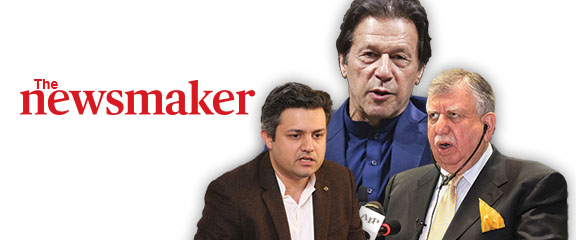By fair means or foul, the Pakistan Democratic Movement (PDM) managed to get its candidate elected to the Senate from Islamabad, defeating the sitting Finance Minister, Dr. Hafeez Sheikh, despite having fewer numbers than the treasury in the National Assembly. The surprise defeat of the government candidate came as a huge blow to Prime Minister Imran Khan, who was subsequently forced to take a vote of confidence from the house.
However, in the election for the Chairman and Deputy Chairman of the Senate, Imran Khan’s candidates sailed through the vote count, despite officially having lesser numbers in the house. The opposition cried foul — the same way Imran Khan did, after his candidate lost the Senate seat from Islamabad. By levelling the score, the PTI managed to get its own back.
The outcome of the Senate elections was more or less in keeping with the government’s expectations, barring the loss of a seat in Sindh and one in Islamabad. In the overall numbers game, the government’s position has improved in the Senate, though not sufficiently enough to have a smooth run when legislating. It will still have to perform a high-wire act to secure the required number of votes each time any bill is brought before the house. Nevertheless, the overall balance of power appears to be tilted in the government’s favour.
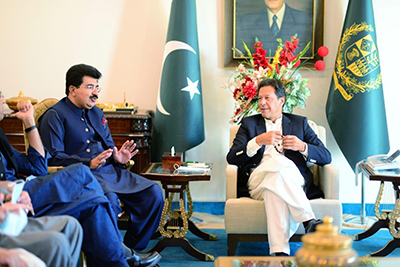
Does this mean that Imran Khan has emerged stronger after the Senate elections? Will he and his team be able to breathe easy now? Will they be able to complete the remaining half of their term in office and implement their reform agenda — at least partially, if not entirely?
The credit or discredit — depending on how one views it — goes to the opposition in that it did manage to create an atmosphere in which Imran Khan appeared vulnerable — for the first time since assuming power in August 2018. The PDM also managed to weave a perception that Imran Khan had failed to deliver on his agenda and that he and his team were hopelessly “incompetent” in running the affairs of the government.
Additionally, the opposition kept targeting the Pakistan Army and the Inter-Services Intelligence (ISI) relentlessly, with no adverse fallout of it on its leaders or the PDM’s rank-and-file. By doing this, the opposition did manage to create and expand the space for itself, strengthening the hawks within its ranks, who advocate attack as the best strategy for defence.
The Army’s complete silence and no visible reaction to the PDM, more specifically the Pakistan Muslim League-Nawaz (PMLN)’s tirade against the institution and its leadership, is also emboldening many fringe groups to amplify their critical voices against the armed forces, using both the traditional and social media. Openly ridiculing and levelling all sorts of allegations against the army has now become extremely fashionable within a tiny segment of society and it is most visible in the media and academia, and among select political, ethnic, sectarian and rights activists.
This situation, in the mid- to long-term, could prove damaging and act as a destabilising factor in the country, as attempts to discredit this institution and create a wedge between the army and the people are rapidly intensifying. However, one view is that the army leadership’s apparent silence in response to all the criticism demonstrates the confidence and strength of the institution.
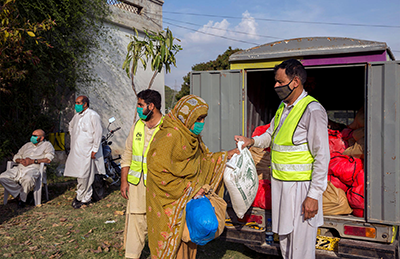
That may well be true, but the strategy the state institutions have adopted carries certain potential risks — the foremost among them being the weakening of the state writ. In such cases, perception often overshadows reality and institutions, despite having all the power at their disposal, lose their capacity to act. They become too sensitive to the dissenting and critical voices from home and abroad, which could result in indecision and inaction on vital issues of national importance.
Even in the Senate elections, some PDM leaders tried to put pressure on the armed forces by first vouching for their “neutrality,” which was followed by the opposition’s unexpected victory against the government candidate. However, when the results of Chairman and Deputy Chairman in the Senate elections went against their expectations, the maligning game restarted.
On the political front, Prime Minister Imran Khan is not only facing increasing heat from the opposition and an overwhelmingly hostile media, but his own ‘house of cards’ appears to be very shaky. Many of the old-time Pakistan Tehreek-e-Insaaf loyalists are disillusioned as Imran Khan is being forced to play the game of power politics, as it must be played in a flawed democracy like Pakistan — by flirting with the electable politicians and those with deep pockets. Then there are those PTI backbenchers who are unhappy as they were not able to secure any of the prized positions or tickets to Parliament.
Imran Khan’s awarding of the Senate tickets to his favourites — instead of on merit, as he had always advocated — has also dampened the spirits of some hard-working second and third tier leaders and workers. A case in point remains Imran Khan’s decision to award tickets to the highly unpopular and controversial, Faisal Vawda, and a new entrant in the party, Saifullah Abro, instead of trusted party hands like Samar Ali Khan and educationist and philanthropist, Hunaid Lakhani.
Although Imran Khan refuses to acknowledge it, his choice of Usman Buzdar as Punjab Chief Minister, is eroding his political base rapidly. Barring his own self, Imran’s “Waseem Akram-Plus” has failed to impress even his own party members. He has become a punching bag — a soft target for the media and the opposition alike. Central Punjab has major issues accepting an uncharismatic chief minister hailing from the backwaters of South Punjab.
Imran has to pay heed to the growing criticism against Buzdar, who has not only become a butt of jokes, but is also being accused of indulging in low-level corruption. This, apart from the stories of his alleged incompetence, which are for too many to ignore. Imran has to somehow make Buzdar perform and help him navigate through the political minefield, if he wishes to continue with him.
However, given Buzdar’s abysmal performance in the first half of his term, chances of his turning over a new leaf appear remote.
Another challenge before Imran Khan is keeping the ruling coalition intact, particularly in Punjab and at the Centre. Although there is no apparent threat to the PTI alliance for now, the demands and expectations of allies require constant management and appeasement at short intervals. Imran Khan, with his aloof nature and a certain arrogance, is not cut out for this kind of wheeling and dealing, which comes naturally to conventional politicians hailing from feudal or tribal backgrounds or the neo-rich urban businesspeople.
However, the biggest challenge confronting Imran Khan and his team is how to meet the expectations of the masses, who are bearing the brunt of the economic slowdown and the rising cost of living, which the opposition is exploiting to the hilt. In these tough times of the Covid pandemic and Pakistan’s past economic mess, there are no quick fixes to turn the economy around and give immediate relief to the masses.
Imran Khan’s economic managers are fixated on the tried and tested formulas doled out by the International Monetary Fund to keep the economy afloat. Any creative and out-of-the box solutions, which were expected from the PTI government, are yet to be seen.
Imran Khan’s slim majority in Parliament and his politics of confrontation also remain impediments in the reform process. This is one front which will prove to be a make-or-break situation for Imran Khan in the coming months.
The PDM will also flex its muscles and try to increase pressure on the government through protests and sit-ins. Imran Khan’s uncompromising and inflexible stance against corruption is the main factor which is keeping the opposition united.
Is Imran Khan willing to play smart politics in the days to come by giving concessions to some and holding others accountable in an attempt to create a wedge within the opposition alliance? His close aides maintain that the prime minister has no such plans. This means the politics of confrontation will intensify in the coming days — both inside and outside parliament — as the PTI government, despite its many constraints, will try to confront the opposition head-on.
Needless to say, the increased political polarisation will take away the government’s focus from governance and its efforts to turn the economy around and carry out sweeping reforms.
Under these trying circumstances, the most important question remains: What options does Imran Khan have to revive the fortunes of his government? Just surviving from one day to the next in Islamabad is hardly a choice, as it will eventually pave the way for the traditional political establishment to strike back and regain what it has lost.
If Imran Khan wants to deliver on his promises, he needs political stability in the country. And political stability can only be achieved either by striking a grand compromise and pursuing the policy of forgive and forget with the opposition or going full throttle against those who are corrupt — both within the rival and the government camps.
While the first is not an option for Imran Khan, the second means playing tough. But for playing tough, the PTI’s besieged government would need the support of all the institutions — from the National Accountability Bureau and all the anti-graft arms of the government to the judiciary and the armed forces.
All state institutions have to be on the same page to enforce political stability in the country in a fair and transparent manner and bring the truly corrupt public office holders — past and present — to justice. The first round of accountability created a lot of sound and fury, but failed to bring the majority of the high-profile cases to a closure.
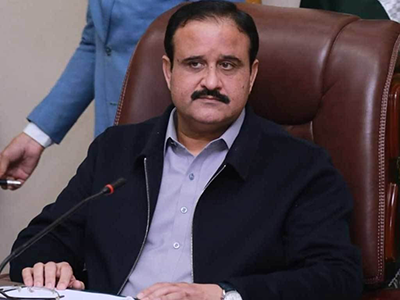
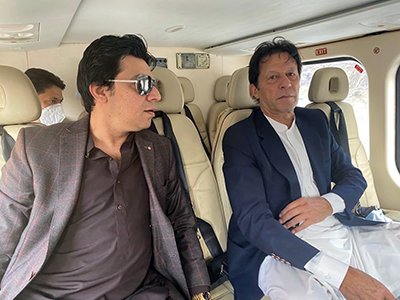
But reenergising the accountability process is easier said than done; there appears to be a lot of hesitation within institutions in pushing this agenda forward. Nawaz Sharif’s departure to London is just one example that illustrates how the accountability process has been derailed for good or applied selectively.
Calling for early elections could also be a choice — as indicated by Imran Khan — but this is far too risky for the PTI at the present moment. Given both the objective and subjective problems of the government, a political storm appears to be in the making for Prime Minister Imran Khan. This time around, the “cornered tiger” will have to play out of his skin to save the day — and to win. Imran Khan has the determination and the stubbornness to take on the challenge, but to overcome it, requires more than good intentions and sound character. The complexities and flaws of Pakistan and its dysfunctional democracy can crush and destroy even the best among us. But for the captain, it is not over till its over. His fans and followers will continue to root for him till he bowls the last ball.
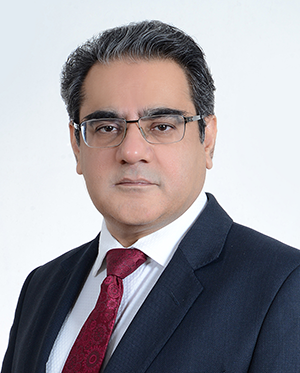
The writer is a senior journalist and managing editor, Narratives.



